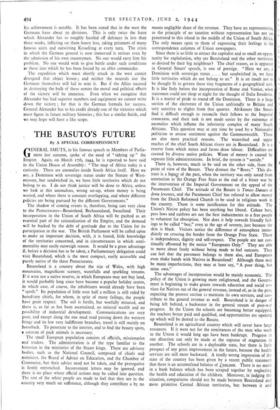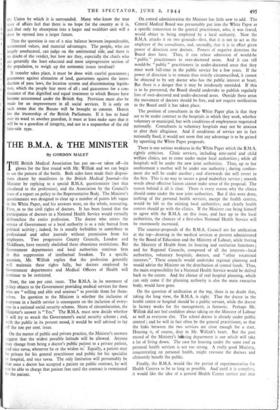. THE BASUTO'S FUTURE
By A SPECIAL CORRESPONDENT The shadow of coming events is, therefore, being cast very close to the Protectorates—Basutoland, Bechuanaland, Swaziland. Their incorporation in the Union of South Africa will be pushed as an essential part of the rationalisation of the Empire, and the demand will be backed by the debt of gratitude due to the Union for its participation in the war. The British Parliament will be called upon to make an important decision, with, it is feared, little knowledge of the territories concerned, and in circumstances in which senti- mentality may easily outweigh reason. It would be a great advantage if, before a decision has to be taken, a Parliamentary delegation could visit Basutoland, which is the most compact, easily accessible and purely native of the three Protectorates.
Basutoland is a country about the size of Wales, with high mountains, magnificent scenery, waterfalls and sparkling streams. If it were not a native reserve, in which Europeans may not buy land, it would probably long since have become a popular holiday centre, in which case, of course, the inhabitants would already have been " spoilt." Its population of little over half a million is still ruled by hereditary chiefs, for whom, in spite of many failings, the people have great respect. The soil is fertile, but woefully misused, and there is, as far as has been ascertained, no mineral wealth and no possibility of industrial development. Communications are very poor, and except along the one mud road passing down the western fringe and its few very indifferent branches, travel is still mainly on horseback. To penetrate to the interior, and to find the beauty spots, a caravan of pack animals is necessary.
The small European population consists of officials, missionaries and traders. The administration is of the type familiar to the historian in the ministries of the Stuart kings. There are advisory bodies, such as the National Council, composed of chiefs and nominees, the Board of Advice on Education, and the Chamber of Commerce, but their advice need not be taken, and the prerogative is firmly entrenched. Inconvenient letters may be ignored, and there is no place where official actions may be called into question. The rest of the white people are made to feel that they are. in the country very mach on sufferance, although they contribute a by no
means negligible share of the revenue. They have no representation, as the principle of no taxation without representation has not yet penetrated to this island in the middle of the Union of South Africa.' The only means open to them of expressing their feelings is the correspondence columns of Union newspapers.
Since there is so-little to attract the capitalist and so small an oppor- tunity for exploitation, why are Basutoland and the other territories so desired by their big neighbour? The chief reason, as is apparent in General Smuts' speech, is one of prestige. " Here we are, a Dominion with sovereign status . . . but sandwiched in, we have little territories which do not belong to us." It is an insult not to be thought fit to govern these tiny fragments of a geographical unit. It is like Italy before the incorporation of Rome and Venice, when statesmen could not sleep at night for the thought of Italia Irredenta. It is a matter of pride to round off the Dominion. There is a large section of the electorate of the Union unfriendly to Britain and very sensitive to slights from that quarter. Afrikaners like Smuts find it difficult enough to reconcile their fellows to the Imperial connexion, and their task is not made easier by the existence of anomalies which inflame the inferiority complex of many South Africans. This question may at any time be used by a Nationalist politician to arouse sentiment against the Commonwealth. There are also more practical reasons. The watershed and upper reaches of the chief South African rivers are in Basutoland. It is a reserve from which mines and farms draw labour. Difficulties are created by diverse native policies. Waste of money is caused by separate little administrations. In brief, the system is " untidy."
There is, however, much to be said on the other side, from the point of view of the Basuto. They distrust the " Boers." This dis- trust is a legaiy of the past, when the territory was only saved from annexation to the Orange Free State at the end of a bitter war by the intervention of the Imperial Government on the appeal of the Paramount Chief. The attitude of the Basuto is Timeo Danaos et dona ferentes, and the Paramount Chief has refused to allow money from the Dutch Reformed Church to be used in religious work in the country. There is some justification for this attitude. The Union's Native policy has been anything but liberal. Colour bars, pass laws and curfews are not the best inducements to a free people to volunteer for absorption. Nor does it help towards friendly feel- ings to be called " boy," even at the age of seventy, just because the skin is black. Visitors notice the difference of atmosphere imme- diately on crossing the border from the Orange Free State. There is independence, dignity and self-respect. The people are not con- tinually affronted by the notice "Europeans Only." They are able to move about freely without being made to feel outcasts. They can feel that the pavement belongs to them also, and Europeans even shake hands with Natives in Basutoland!. Although there may be many imperfections, they may at least. say, ." A poor thing, but mine own."
The advantages of incorporation would be mainly economic. The policy of the Union is growing more enlightened, and the Govern- ment is beginning to make grants towards education and social srr- vices for Natives out of the general revenue, instead of, as in the past, expecting the poorest section to maintain its own services, and con- tribute to the general revenue as well. Basutoland is in danger of being left behind, a backwater in the general stream of post-war progress. In the Union the schools are becoming better equipped, the teachers better paid and qualified, and opportunities are opening up which will be denied to the Basuto.
Basutoland is an agricultural country which will never have large resources. If it were not for the remittances of the men' who work in the Union ii would long ago have been bankrupt. Progress in one direction can only be made at the expense of stagnation in another. The schools are in a deplorable state, but there is little prospect of any great improvement in the future, because the health services are still more backward. A totally wrong impression of the state of the country has been given by a recent public statement that there is an accumulated balance of £Soo,000. There is no merit in a bank balance which has been scraped together by neglecting the health and education of the children. Moreover, in judging the situation, comparisons should not be made between Basutoland and more primitive Central African territories, but between it and
the Union by which it is surrounded. Many who know the true state of affairs feel that there is no hope for the country as it is, and that only by absorption into a larger and wealthier unit will a door be opened into a larger future.
Thus the question is one of a nice balance between imponderable, sentimental values, and material advantages. The people, who are largely uneducated, can judge on the sentimental side, and there is no doubt of the verdict, but how are they, especially the chiefs who are generally the least educated and most unprogressive section of the population, to weigh up the economic issues involved?
If transfer takes place, it must be done with careful guarantees ; guarantees against alienation of land, guarantees against the intro- duction of pass laws, the location system and discriminating legisla- tion, which the people fear most of all ; and guarantees for a con- tinuance of that dignified and equal treatment to which Basuto have become accustomed under the British flag. Provision must also be made for an improvement in all social services. It is only on such terms that the Basuto will be brought to consent. Herein lies the trusteeship of the British Parliament. If it has to hand over its ward to another guardian, it must at least make sure that it will be to a guardian of integrity, and not to a stepmother of the old fairy-tale type.



























 Previous page
Previous page